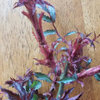Ortho vs. Bayer Advanced for BS?
addiesue
14 years ago
Hello all....several folks swear by Bayer Advanced Disease Control for advanced BS on roses but I have looked every where for it here.....Lowes, HomeDepot, Ace Lawn & Garden, and the local nurseries, and no one seems to carry it here locally. Has anyone used the Ortho Rose Pride Disease Control? I've used it as a preventative (didn't treat early enough this year) but not to treat after the fact and was wondering how effective it would be if I use it every week like some folks on here suggest using Bayer for advanced BS. Has anyone used it to treat BS? It's kind of expensive and I have 25 rose bushes to treat and am very cautious to "experiment" because of the cost factor. I really need something that has been tried and proven to work...can you tell I'm desperate!...lol....(crying)...lol.....(AUGHHHH,,,,,crying).
Addiesue


henryinct
michaelg
Related Professionals
Fort Lee Landscape Architects & Landscape Designers · South Elgin Landscape Architects & Landscape Designers · Zion Landscape Architects & Landscape Designers · Buford Landscape Contractors · Bridgeport Landscape Contractors · Brookfield Landscape Contractors · Cupertino Landscape Contractors · Englewood Landscape Contractors · Gallatin Landscape Contractors · Hannibal Landscape Contractors · Hilton Head Island Landscape Contractors · Lewisville Landscape Contractors · Natick Landscape Contractors · Parker Landscape Contractors · View Park-Windsor Hills Landscape Contractorsdiane_nj 6b/7a
athenainwi
Jean Marion (z6a Idaho)
addiesueOriginal Author
Maryl (Okla. Zone 7a)
michaelg
Maryl (Okla. Zone 7a)
michaelg
Maryl (Okla. Zone 7a)
buford
phylrae
henryinct
addiesueOriginal Author
phylrae
michaelg
henryinct
henryinct
buford
michaelg
Maryl (Okla. Zone 7a)
henryinct
michaelg
diane_nj 6b/7a
henryinct
Maryl (Okla. Zone 7a)
timberling
buford
Maryl (Okla. Zone 7a)